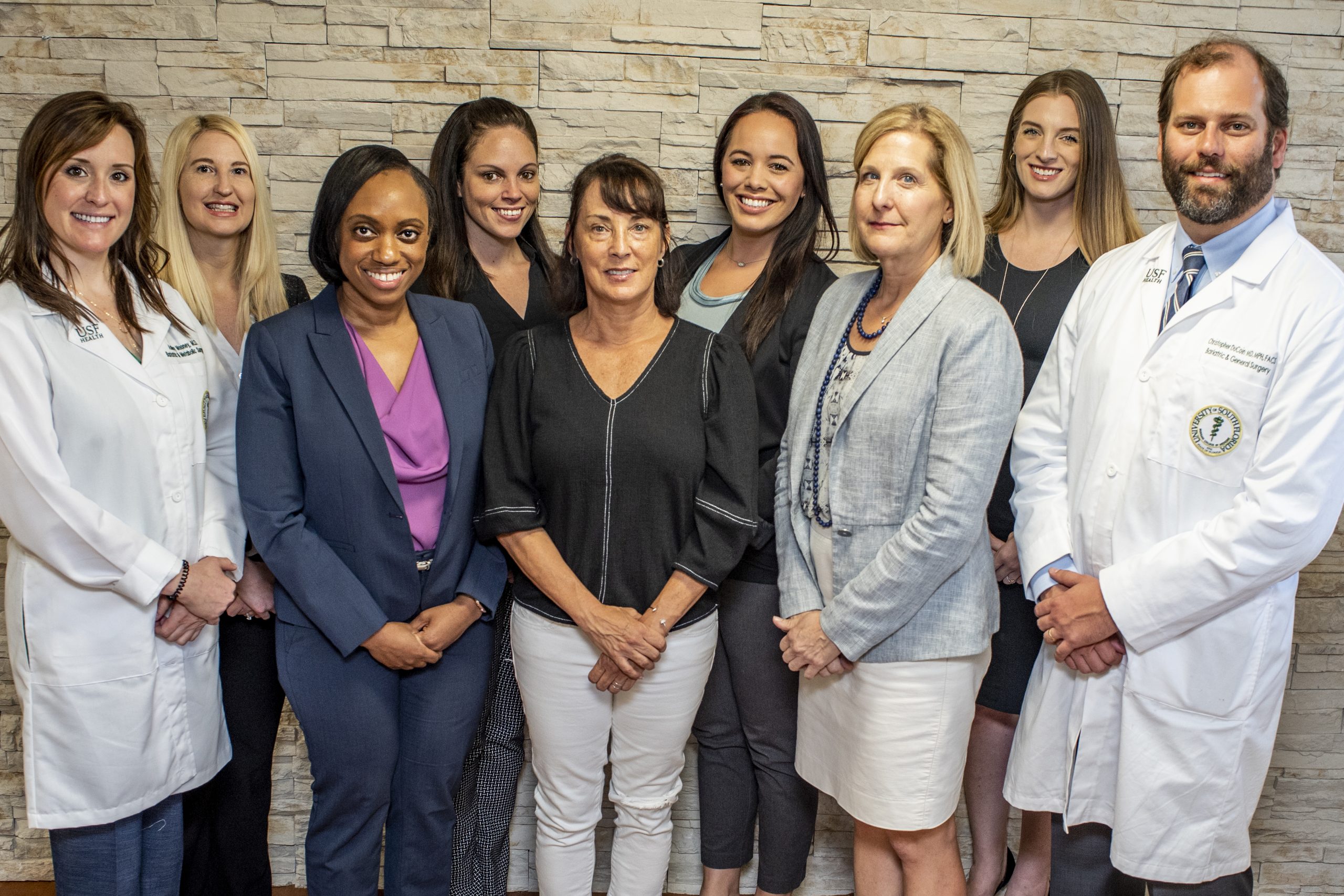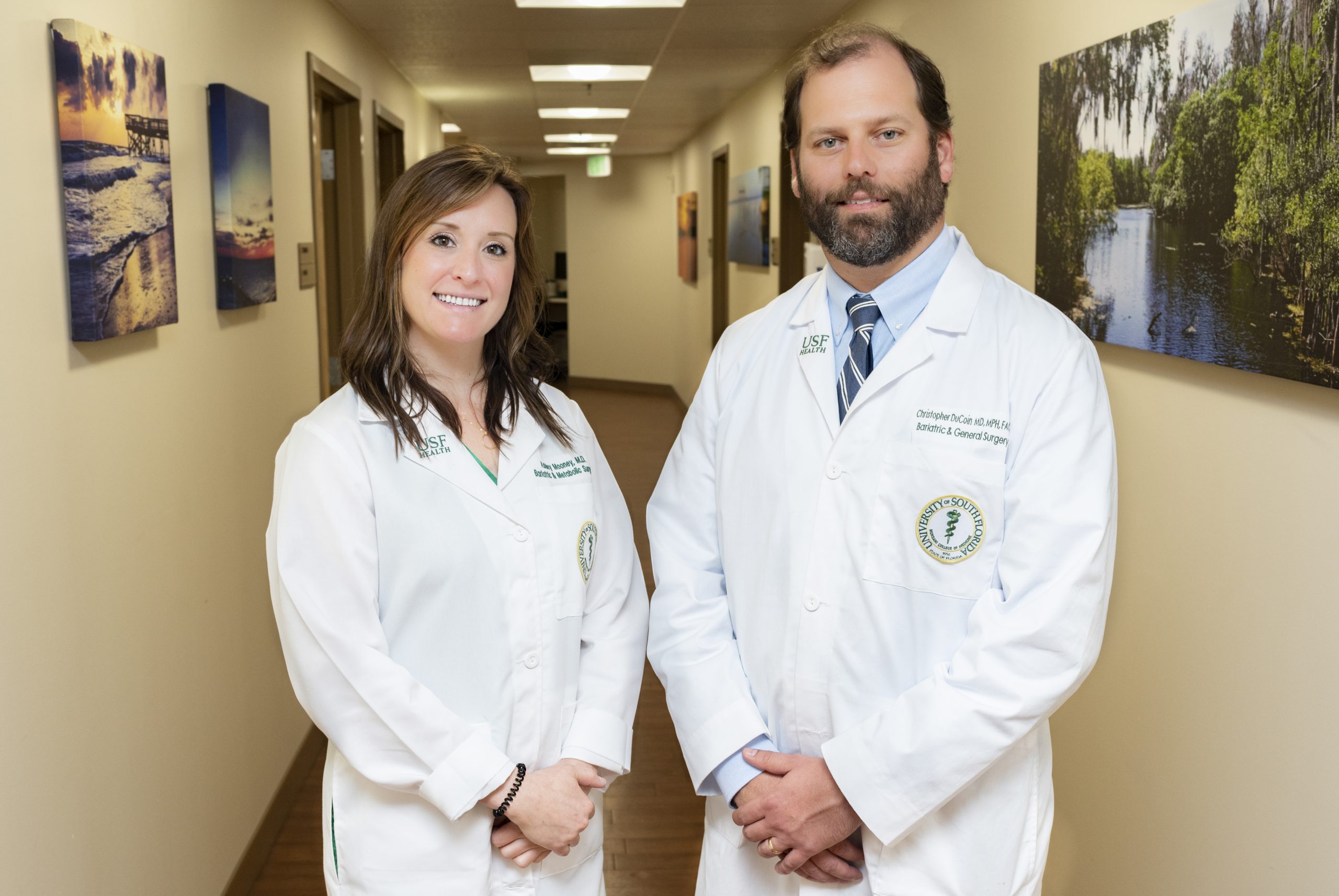
A short, yet powerful “they saved my life” is how Jeremy Blythe describes the team at the Tampa General Hospital + USF Health Bariatric Center.
Weight had always been a struggle for Jeremy while growing up, but he never let being “the big guy” stand in his way of living his life, even when simple tasks like tying his shoes or putting on a belt became a challenge. Standing over 6 feet tall, Jeremy weighed 612 pounds by his thirties. After seeing his father and other family members pass away before age 60, Jeremy decided that he was not going to follow that same path. “I want a family with my wife, and I want to be able to be around a long time and be able to do things with them,” Jeremy said.
That’s when Jeremy decided to take control of his life and seek professional help from the TGH + USF Health Bariatric Center, a team that came highly recommended to him. The TGH + USF Health Bariatric Center is a Comprehensive Center with Adolescent Accreditation under the Metabolic and Bariatric Surgery Accreditation and Quality Improvement Program. Within a supportive and encouraging atmosphere, patients have access to both surgical and non-surgical bariatric services, and the goal of the team approach to care is to help patients not only lose weight but improve their overall health. “When your weight gets that high, your body just can’t tolerate it and it’s not about the illness Jeremy currently had, but all of the future illnesses he was destined to get,” said Christopher DuCoin, MD, MPH, FACS, medical director and bariatric surgeon at the TGH + USF Health Bariatric Center.

Dr. Ashley Mooney and Dr. Christopher DuCoin worked together on Jeremy’s bariatric surgery at the TGH + USF Health Bariatric Center.
The robotic assisted sleeve gastrectomy was selected as the best option for Jeremy because, as Dr. DuCoin describes it, the procedure is extremely safe, even safer than gallbladder surgery, a hysterectomy, or elective knee surgery, and has quick patient recovery. Gastric bypass was considered, but it’s an intense operation that is often used for patients with Type II Diabetes and severe reflux disease. Since Jeremy did not have those comorbidities, there was no need to add any unnecessary risk to his surgery.
“When you combine laparoscopy, or small incisions, with robotic surgery, it really aids the surgeon in the visualization of the operative field, dexterity and the safety profile of the procedure,” Dr. DuCoin said.
The TGH + USF Health Bariatric Center is one of the busiest academic centers in Florida for bariatric robotic surgery. The facility is equipped with chairs, toilet seats, beds, doorframes, wheelchairs and scales that are specifically made for patients of a larger size. Even the operating table and instruments that are used for bariatric surgery are designed with the needs of that patient population in mind. Patients also have access to telehealth appointments to prevent mobility, transportation, or distance impeding a patient getting the services they need. Being a part of a large hospital also means that if a patient suddenly needs intensive care or specialized medical support during or after surgery, the infrastructure would be able to take care of them. The hospital staff and the entire system is trained to care for these patients from a holistic perspective and they not only know the safest way to transfer and move these patients, but also how to empathize.
“The team really facilitates a no-judgement atmosphere where these patients can feel welcome and are somewhere where they can come and be themselves,” said Ashley Mooney, MD, bariatric surgeon at the TGH + USF Health Bariatric Center.
Deciding on the best procedure for Jeremy was only the beginning of the six-month, pre-operative process. In order to be approved for surgery, Jeremy had to be cleared by the entire bariatric team after meeting their designated goals for him such as, “reaching a weight around 577 pounds, getting out of the pre-diabetic range, improving his iron and Vitamin D deficiencies, stopping his vaping habit, and consistently wearing a continuous positive airway pressure (CPAP) sleep apnea machine,” said Erica Francois, DNP, APRN, bariatric nurse practitioner at the TGH + USF Health Bariatric Center. During this part of Jeremy’s journey, he met with nurse practitioners, nutritionists, psychologists, cardiologists, pulmonologists, sleep study therapists, lab technicians, among many others who played a crucial role in Jeremy’s success in the program. This team-based care conveniently falls under one roof and not only makes having a variety of specialty appointments and accessing medical records a seamless process for patients, but it also facilitates collaboration.
“We’re all on the same page, we speak the same language,” Dr. Mooney said. “All the providers meet weekly and discuss difficult patients or patients who are on the path to surgery, so the communication is incredibly effective.”

The TGH + USF Health Bariatric Center team
A critical piece of the pre-operative process for Jeremy was addressing his emotional eating habits.
“This part of the journey was important because for me, and I firmly believe that, for most people, it is a head game,” Jeremy said. “Getting your head right and dealing with the emotional side of your eating issues will make or break you. Mental health is a key factor in the success of this process.”
The Center’s Clinical Bariatric Psychologist Rebecca Chermak, PsyD, explains that receiving cake as a celebratory reward or ice cream when you have a bad day can start from great intentions in childhood, but can quickly turn into an emotional eating habit in adulthood.
“Food is the most easily accessible, readily available, and non-judgmental ways to navigate through some of life’s stressors,” Dr. Chermak said. “Even though Jeremy always had a smile on his face, he acknowledged that he was hurting on the inside and had been struggling with depression ever since he was a young boy and often used food as a way to cope.”
“Dr. Chermak is one of the best psychologists I have ever spoken with,” Jeremy said. “She doesn’t come at you from a medical standpoint as much as a human to human. Her ability to connect with and help her patients is unbelievable.”
Patients also have to understand and prepare for the lifelong commitment they’re making before going into surgery.
“You have to realize that you won’t just wake up and be ‘skinny’ – there is work involved,” Jeremy said. “You must change your eating habits: how you drink, how you eat, when you drink, when you eat. Everything changes, and you have to position yourself to be as ready as you can before going into the surgery.”
Another crucial part in the success of this lifelong commitment is the support of friends and family. Jeremy’s inspiration for changing his life was to be around as long as possible for his family. But in order for him to get to that healthier place, he was going to need their support, too. Luckily, Jeremy was surrounded by an extended family and close friends who are very supportive, especially the love of his life and wife of 10 years, Hannah.
After months of hard work and the support of family and the services offered by the Bariatric Center, Jeremy was able to achieve his goals and was approved for surgery. Jeremy said he was able to stay positive and on track to his goal by keeping his “eye on the prize.”
“In the beginning, you’re going to hate it, I won’t lie,” Jeremy said. “It’s all very difficult. What you have to continue to remind yourself of is, look at what you’re gaining. I’m going to live, hopefully, an additional 20 to 40 years because I am investing in myself. I am taking care of myself for me and my family. As you start to drop weight and feel better, it almost becomes automatic. Be patient, be kind to yourself and listen to your body.”
On January 28, 2020, Jeremy had his surgery and was in and out of the hospital in under 24 hours.
“I was excited, I was scared, I was worried, but most importantly, it was the first time in my life I didn’t feel hopeless,” Jeremy said. “I didn’t feel like I couldn’t fight the weight loss fight any longer. I had hope and to me, that is worth more than my weight in gold! That’s a lot of gold.”

Jeremy has lost 161 pounds since his surgery (Photo: Courtesy of Jeremy Blythe)
Jeremy has lost 161 pounds after five months post-operation. The first 6 to 12 months after surgery is an intense, rapid-weight loss phase in which Jeremy frequently visits with dieticians and nurse practitioners at the TGH + USF Health Bariatric Center as a part of the post-op care program. By the second year, he will visit on an annual basis for continued long-term support. The entire medical staff at the Bariatric Center echoes the sentiment that when you become their patient, you’re their patient for life.
“They are invested with you along the entire process. Everybody there is so supportive and genuine,” Jeremy said.
“I think we all feel much more confident that Jeremy’s going to live a much longer, healthier, hopefully happier life and I think we see that every time we encounter him. It’s really why a lot of us do this because we know we are making a substantial impact in their life,” Dr. DuCoin said.
Jeremy’s goal weight is 275 pounds and he looks forward to the day that he’s able to experience canoeing, horseback riding, and kayaking for the first time because his weight has always restricted him from participating. He also looks forward to once again being able to ride roller coasters and fly on airplanes. “My current weight loss success makes me feel so happy,” Jeremy said. “I feel refreshed and ready to conquer the world and to keep fighting for a healthier body.”
To the team at the TGH + USF Health Bariatric Center, Jeremy says, “Thank you for giving me hope. Thank you for giving me the opportunity to show myself that I can do this. Thank you from the bottom of my ‘no longer enlarged heart due to heavy weight’ for saving my life. You have given me purpose and you have truly done something for me that I will never, ever forget and for doing it with such compassion, poise, and confidence. You are my true miracle workers, my true heroes.”
After gaining his new lease on life, Jeremy wants to encourage others who are significantly struggling with their weight to leave their inhibitions behind, believe in themselves and give the TGH + USF Health Bariatric Center a call. He believes that even though making that first step is scary, the alternative is worse.
“It’s a very humbling experience once you realize that how you have been living is no longer working for you,” Chermak said. “The amount of bravery that it takes to initially call and make that first appointment is one of the most powerful things anyone can do towards their future.”
For more information about the bariatrics services available at the TGH + USF Health Bariatric Center, email bariatriccenter@tgh.org or call (813) 844-7473.
